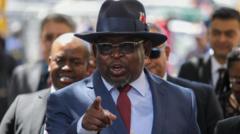South Africa is facing significant turbulence as the announcement of its national budget has sparked fierce debate within the coalition government. After a month-long delay, Finance Minister Enoch Godongwana revealed his budget proposal, which has drawn criticism from critical coalition partners. The African National Congress (ANC), which formed a government of national unity (GNU) with several parties after losing its parliamentary majority in the last elections, is struggling to gain support for its budget plan.
A proposed increase in value-added tax (VAT) stirred controversy, prompting Godongwana to modify his initial plan. He revised the VAT increase from 15% to 16%, fearing that further taxes could deepen the financial burden on citizens amid a rising cost-of-living crisis. Critics argue that recent tax proposals would disproportionately affect the poorest South Africans, leading to widespread economic hardship.
With the main coalition partner, the Democratic Alliance (DA), opposing the budget, the ANC finds itself in a precarious position. The coalition's stability is now at risk, with potential defections and vehement opposition from major political factions further complicating matters.
Experts have expressed concerns about the implications of this deadlock, warning that the path ahead could lead to significant political upheaval if the budget fails to pass. Godongwana's credibility as finance minister is also under scrutiny as he faces increasing pressure to reshape the budget to address the diverse needs of the coalition while maintaining essential public services.



















